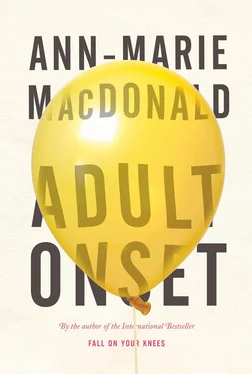For some reason, Mary Rose told Hil she had done laundry tonight, which was untrue but only according to the rules of this universe wherein we recall the past but not the future; she had no reason to lie about laundry. Is there a tear in the amniotic sac between worlds? Memories leaking, mingling … she’ll make a note of this just as soon as she’s put in a load.
She heads upstairs, picks up the children’s overflowing hamper and, on the way back down, steps on the hem of her housecoat and nearly pitches headfirst to the bottom. She needs to be more mindful or she’ll wind up painting calendars with her mouth. In the basement rec room, she switches on the baby monitor, puts in a load of teensy T-shirts and tiny Y-fronts, and tunes into a rerun of Law and Order . Jerry Orbach and Chris Noth barge into a Manhattan boardroom and collar some fat cat — her favourite type of episode. She reclines on the shameless La-Z-Boy couch and relaxes, kind of wishing Hil were here with her, kind of glad she isn’t. On the walls, framed show posters and book jackets have been upstaged by laminated crayon renderings of murky flora and fauna and various wheeled objects, along with family photos — including an Olde Tyme portrait of the four of them dressed as outlaws with Daisy in a bonnet.
Chris and Jerry have just stopped at a hot dog stand in midtown Manhattan when the monitor emits the first tinny snufflings that Mary Rose knows will shortly become a full-blown—“Mumma-a-a!” She runs up the stairs. After she has changed Maggie, brought Matthew a glass of water, rewound his unicorn and settled Maggie with yet another bottle, she goes to her bathroom, takes another Advil — four in a day is hardly an overdose — and hauls up her sleeve.
Down the front of her left arm, from pit level to a few inches above her elbow run the scars, one superimposed upon the other, layered — sedimentary scars. Like limestone, they tell a story. The longer scar is the older one, having grown with her from the time she was ten. Her father told her she would be getting bone from the bone bank, and she pictured a metal safety deposit box with a bit of bone in it. “Probably a piece of someone’s kneecap,” he added with a grin, making it sound quirky and mischievous. She thought of her Halloween skeleton costume and grinned back. The base of the shorter scar widens into a slight depression: site of a post-op infection that she understood to be serious when her mother calmly said, “Tsk-tsk,” as she dabbed at the ooze with a sterile Q-tip. This shorter scar dates from the second bone surgery, when she was fourteen. She was her own donor that time.
Mary Rose is O negative, which means she is a universal donor. As such she can donate tissue to any human on the planet, but only someone with her blood type can donate to her. So the second time round, the surgeon harvested bone from her iliac crest — which sounds more important than “hip bone”—thus there is a third scar down there at her “bikini line” that tends to mind its own business unless clipped by the corner of a countertop, at which it kicks up a scintillating sort of pain like a vampire awakened at noon.
The bone grafts were done to repair bone cysts. Unlike other kinds of cysts, which are the presence of unhealthy tissue, bone cysts are an absence: cavities in the bone that fill with a yellowish fluid. Sometimes they contain bone fragments — bits that flake and fall from within, so-called “fallen leaf fractures.” If the cysts go untreated, they can invade the growth plate and you end up with one limb shorter than the other — a limb that will just go on breaking. Mary Rose was lucky and she has the scars to prove it.
•
The funeral director speaks good English. He asks the young air force officer if he would like to hold the casket. Duncan reaches out and takes the small white coffin. His commanding officer is present along with the air force nurse. His wife is still in hospital, and in any case, there is no need to put her through this. Afterwards, he drives to the cemetery with the casket on the front passenger seat beside him.
•
Mary Rose does not dwell on her time in hospital — it seldom comes up unless she is required to enter one. The memory, while vivid, is stored in a separate file, such that were she to have a near-death experience, the repeated injuries and surgeries would not be included in the movie of her life that would flash before her eyes — though they might play as a blooper reel. The whole experience exists outside her personal timeline, because it is an anomaly: bone cysts are ahistorical. “Idiopathic, likely a congenital flaw,” said the surgeon. “That means you’re born with them,” said Dad. “It doesn’t mean you’re an idiot.” Bone cysts are a singularity, like a meteor strike: a good story on their own but unlinked to the main narrative. She was past thirty before an old slow penny dropped: the bone from the bone bank hadn’t come from some plucky donor’s kneecap, as cheerfully shared as a pint of blood. It had been cadaver bone. That may be why the tissue failed to grow with her.
She cannot remember a time before the age of ten when she did not have a “sore arm.” It was normal for her, she thought everyone had one. It was an artifact among her and her siblings: “Mary Rose’s sore arm.” Even Andy-Patrick respected her sorearm and would punch the other one. Hot and searing, or cold grey thudding; one kind of pain had more blood and bruise in it, the other more bone. It came and went.
Her first memory of the searing dates from the summer she was four. They had moved from Germany to Canada, and were “down home” on Cape Breton Island in the broad bosom of Dolly’s family on the beautiful Bras d’Or lakes. Cabins called bungalows dotted the clearing on a hill above the shore. A brook ran pure and cold through the trees, spanned by a tiny footbridge and lined with moss-cushioned rocks, the ground itself springy with life. It wasn’t the Black Forest — you were more apt to meet a fairy than a talking wolf — but it was enchanted in its own way. Down on the shore, dozens of cousins sprinted and leapt from the rickety wharf, the older ones drove the boat, and there was always pop. At night, she counted her mosquito bites and wondered where to sleep. Her sister was housed with the older kids, her mother with her own sisters, and her father had yet to arrive — he would join them when his leave started.
Dolly was beloved in her family but, being both junior and female, reverted in their company to the status more of a younger sister than a mother, with the consequence that, while food was celebrated, luscious and Lebanese — spits turning on the fire, picnic tables groaning, coolers overflowing — Mary Rose at times went to bed hungry. At four, she felt it would be rude to ask for food, it would be like saying, “You haven’t fed me,” and that would be rude. The men and boys were served first —sah t’ein! — and by the time Mary Rose understood that it was suppertime, somehow it was over. It would be all right when Dad arrived. She would sit on his lap and eat from his plate, and at night he would tuck her in, somewhere. In the meantime, she was free to roam, the salt water healed all scrapes and the green world of the woods beckoned.
One afternoon, he arrived. “Dad!” Like a prince, strolling down the winding dirt drive beneath the canopy of pines and birches. Like a movie star, a god. He gave all the kids airplane swings, grasping them by ankle and wrist, all the cousins lining up, “Unca Dunc!” His was the only blond head in a sea of ebony, his the only blue eyes amid lustrous brown, “Swing me, swing me!” Tirelessly he swung them. He swung her round and round and it was tummy-thrilling, until fire broke out inside her arm. Snapped into flame like a twig, it leapt and spread. When he set her down, she held her arm by the elbow. She did not throw up.
Читать дальше












